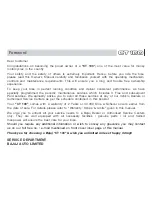
90
CLEANING THE VEHICLE AND INACTIVITY
It is a good rule to clean the vehicle periodically to
keep its parts in good condition.
If the vehicle is used in the following conditions,
more frequent washing is recommended:
- Coastal areas or areas with a hot and humid
climate in which the humidity and salinity in
the atmosphere are higher than normal.
- Roads or areas where salt or chemical products
are used to melt snow and ice.
- Roads or areas where there are industrial dusts
or patches of tar.
- Sporting use and off-road riding.
- Presence on the vehicle body of dead insects,
bird droppings, etc.
It is advisable not to stop or park the vehicle under
plants or trees. In some seasons certain plants and
trees release residues, resins, fruits or leaves con-
taining harmful substances (in particular harmful
for the bodywork).
RULES FOR WASHING
Do not wash the vehicle in direct sunlight, espe-
cially in summer, when the body is still warm since
the detergent would dry before rinsing and could
thus damage the paintwork.
Do not use liquids at a temperature over 40°C to
clean the plastic parts of the vehicle.
Do not direct high-pressure air (or water) jets or
steam jets onto the following parts:
- wheel hubs;
- controls located on the right and left side of the
handlebar;
- cuscinetti;
- bearings;
- brake tanks and pumps;
- instruments and indicators;
- silencer outlet;
- steering lock;
- fuel filler cap and other caps or plugs;
- lamps;
- electrical connections;
- decals.
Do not use alcohol, petrol or solvents to clean plas-
tic or rubber parts or the saddle.
NOTE:
to clean the external parts of the engine
only, use a degreasing detergent, brushes and
cloths, see page 97 LUBRICANTS table.
Using a high-pressure water jet could damage cer-
tain vehicle parts.
Use a low-pressure water jet to rinse the vehicle
thoroughly and in particular the dirtiest parts. Us-
ing a soft sponge for the bodywork, wipe over the
whole vehicle.
Rinse the vehicle thoroughly, always using a low-
pressure water jet. Dry with a clean chamois leath-
er.
RULES FOR END OF WASHING
Braking efficiency could be reduced after washing,
since brake disks and pads are wet.
It is therefore advisable to dry the disks well and
wait for the pads to dry, after which proceed with
caution and repeatedly try out the brakes.
Only after meticulous and thorough washing should
you proceed with polishing using silicone wax.
Do not use abrasive pastes on the vehicle, since
they ruin flat varnishes.
Do not apply protective wax on the braking parts,
disks and pads, as it could affect their operation. Do
not apply it on the saddle either, as it could make it
slippery and therefore be the cause of a fall.
INACTIVITY
If the vehicle is not going to be used for several
months, it is advisable:
- to clean and protect the painted parts by apply-
ing special waxes;
- to drain all the fuel from the tank, close the tap
and make sure there is none in the float cham-
ber. To do this, close the tank tap and start the
vehicle. Wait for it to cut out on its own;
- remove the spark plug and pour a spoonful of
oil for two-stroke engines into the cylinder. Re-
place the spark plug and use the kick starter to
spread oil over the walls of the cylinder;
- periodically check the tyre pressure;
- lubricate the chain;
- cover the end of the exhaust pipe with a bag
and tie it tightly to prevent humidity from en-
tering;
- cover the vehicle with a sheet (in cotton or
wool or other breathable material) that is large
enough to fully cover it but without touching
the ground.
AFTER A PERIOD OF INACTIVITY
- Uncover and wash the vehicle, see page 90
(CLEANING).
- Fill the fuel tank, see page 77 (FUEL).
- Carry out the preliminary checks, see page 66
(PRELIMINARY CHECKLIST).
Do a test run of a few kilometres at a moderate
speed in an area with no traffic.
Summary of Contents for Caballero 125 series
Page 1: ......
Page 48: ...48...
Page 94: ...94 NOTES...
Page 97: ...97 ENGLISH...
Page 100: ...100...
Page 147: ...147 FRAN AIS NOTES...
Page 152: ...152...
Page 160: ......















































